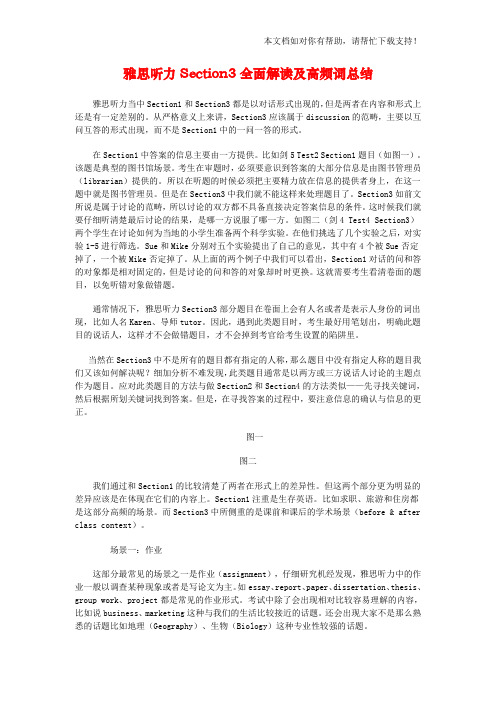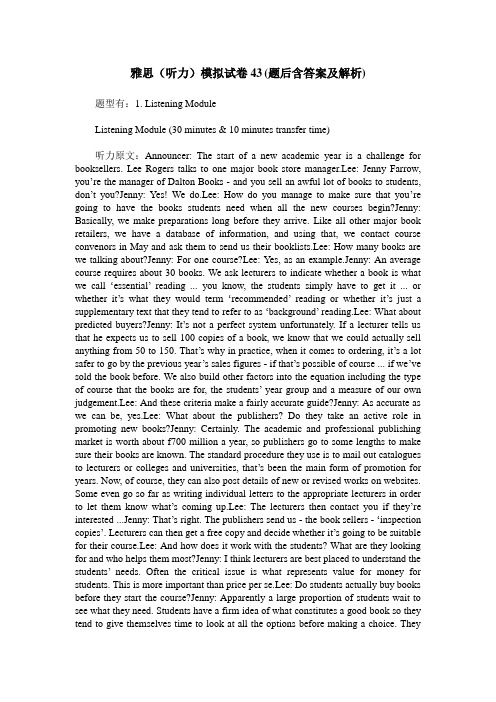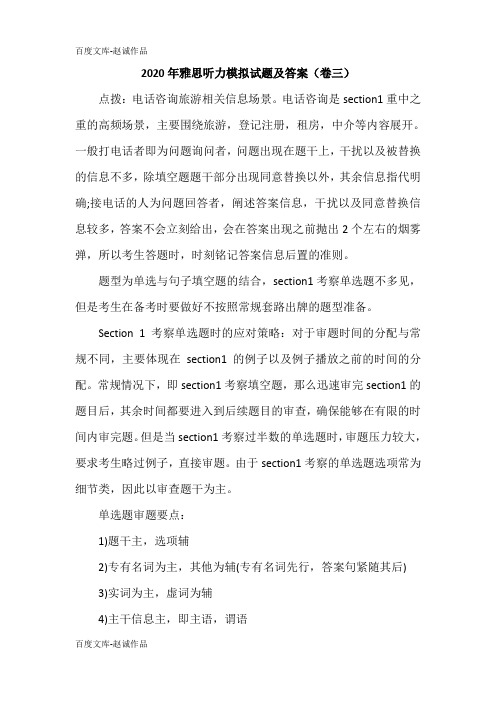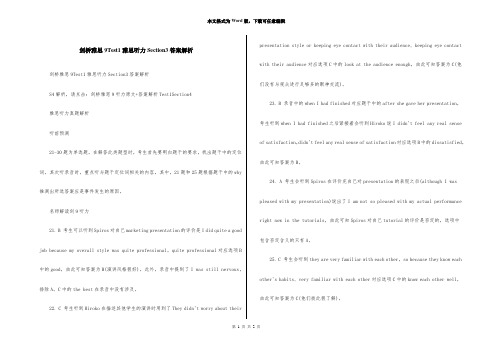2020年4月30日雅思听力真题预测(Section 3)
4.30雅思听力预测

V50130s2,s3;V50133s2;V50134s4;V50147s2,s3; V50121S4
有时间也背背: V40101s1s2s3,V40102s1,V40103s2,V40106s1s2,zV40109s1s2,V40110s2,
4.30雅思听力预测:最重点
V08120S1S4; V081206S3; V08124S2; V08125S4; V08129S1; V08130S4; V08135S4; V08136 S2; V08142S1;V08143S2S4;V08145S2;V08147S1S3;V08118S1;V08101S2, V08110S4,V08111S1S4, V08116S2,08417S1;
V30064s1s2,s3;V30049s3;V30060s1,s4;V30061s1,s2;V30062s3,s4;
V30072s1;V30076s1;V30078s1,s2,s4;V30081s1,s3;V30083s4; V30090s4;V30044S2S3,V30062S2, V30081S2S4,V30086S2S3
4.30雅思听力预测:次重点
V08107S3; 08111S3; V08114S2; V08116S3; V08125S3; V08132S3; V08133S2S4; V08136S3; V08138S2; V08141S1; V08143S1S3;V08144S4; V08417S2;V09124S2,V09125S4, V09130S1S4,V09131S1,V09133S3
导读为方便考生备战430日雅思考试?无忧考网小编整理出430雅思听力预测希望考生根据雅思考试预测来提高成绩预祝考友们考试顺利通过
雅思听力Section3全面解读及高频词分享

雅思听力Section3全面解读及高频词总结雅思听力当中Section1和Section3都是以对话形式出现的,但是两者在内容和形式上还是有一定差别的。
从严格意义上来讲,Section3应该属于discussion的范畴,主要以互问互答的形式出现,而不是Section1中的一问一答的形式。
在Section1中答案的信息主要由一方提供。
比如剑5 Test2 Section1题目(如图一)。
该题是典型的图书馆场景。
考生在审题时,必须要意识到答案的大部分信息是由图书管理员(librarian)提供的。
所以在听题的时候必须把主要精力放在信息的提供者身上,在这一题中就是图书管理员。
但是在Section3中我们就不能这样来处理题目了。
Section3如前文所说是属于讨论的范畴,所以讨论的双方都不具备直接决定答案信息的条件。
这时候我们就要仔细听清楚最后讨论的结果,是哪一方说服了哪一方。
如图二(剑4 Test4 Section3)两个学生在讨论如何为当地的小学生准备两个科学实验。
在他们挑选了几个实验之后,对实验1-5进行筛选。
Sue和Mike分别对五个实验提出了自己的意见,其中有4个被Sue否定掉了,一个被Mike否定掉了。
从上面的两个例子中我们可以看出,Section1对话的问和答的对象都是相对固定的,但是讨论的问和答的对象却时时更换。
这就需要考生看清卷面的题目,以免听错对象做错题。
通常情况下,雅思听力Section3部分题目在卷面上会有人名或者是表示人身份的词出现,比如人名Karen、导师tutor。
因此,遇到此类题目时,考生最好用笔划出,明确此题目的说话人,这样才不会做错题目,才不会掉到考官给考生设置的陷阱里。
当然在Section3中不是所有的题目都有指定的人称,那么题目中没有指定人称的题目我们又该如何解决呢?细加分析不难发现,此类题目通常是以两方或三方说话人讨论的主题点作为题目。
应对此类题目的方法与做Section2和Section4的方法类似——先寻找关键词,然后根据所划关键词找到答案。
雅思(听力)模拟试卷43(题后含答案及解析)

雅思(听力)模拟试卷43(题后含答案及解析) 题型有:1. Listening ModuleListening Module (30 minutes & 10 minutes transfer time)听力原文:Announcer: The start of a new academic year is a challenge for booksellers. Lee Rogers talks to one major book store manager.Lee: Jenny Farrow, you’re the manager of Dalton Books - and you sell an awful lot of books to students, don’t you?Jenny: Yes! We do.Lee: How do you manage to make sure that you’re going to have the books students need when all the new courses begin?Jenny: Basically, we make preparations long before they arrive. Like all other major book retailers, we have a database of information, and using that, we contact course convenors in May and ask them to send us their booklists.Lee: How many books are we talking about?Jenny: For one course?Lee: Yes, as an example.Jenny: An average course requires about 30 books. We ask lecturers to indicate whether a book is what we call ‘essential’reading ... you know, the students simply have to get it ... or whether it’s what they would term ‘recommended’reading or whether it’s just a supplementary text that they tend to refer to as ‘background’ reading.Lee: What about predicted buyers?Jenny: It’s not a perfect system unfortunately. If a lecturer tells us that he expects us to sell 100 copies of a book, we know that we could actually sell anything from 50 to 150. That’s why in practice, when it comes to ordering, it’s a lot safer to go by the previous year’s sales figures - if that’s possible of course ... if we’ve sold the book before. We also build other factors into the equation including the type of course that the books are for, the students’ year group and a measure of our own judgement.Lee: And these criteria make a fairly accurate guide?Jenny: As accurate as we can be, yes.Lee: What about the publishers? Do they take an active role in promoting new books?Jenny: Certainly. The academic and professional publishing market is worth about f700 million a year, so publishers go to some lengths to make sure their books are known. The standard procedure they use is to mail out catalogues to lecturers or colleges and universities, that’s been the main form of promotion for years. Now, of course, they can also post details of new or revised works on websites. Some even go so far as writing individual letters to the appropriate lecturers in order to let them know what’s coming up.Lee: The lecturers then contact you if they’re interested ...Jenny: That’s right. The publishers send us - the book sellers - ‘inspection copies’. Lecturers can then get a free copy and decide whether it’s going to be suitable for their course.Lee: And how does it work with the students? What are they looking for and who helps them most?Jenny: I think lecturers are best placed to understand the students’needs. Often the critical issue is what represents value for money for students. This is more important than price per se.Lee: Do students actually buy books before they start the course?Jenny: Apparently a large proportion of students wait to see what they need. Students have a firm idea of what constitutes a good book so they tend to give themselves time to look at all the options before making a choice. Theytend to go for books that are clear and easy to use. Often the texts that their lecturers recommend turn out to be too academic and remain here on our shelves.Lee: Well that was Jenny Farrow ...SECTION 3 Questions 21-30Complete the notes below.Write NO MORE THAN THREE WORDS or A NUMBER for each answer.Procedure for Bookshops▼Keep database of course/college details.▼In May, request 【21】______ from lecturers.▼Categorise books as —essential reading【22】______ reading—background readingWhen ordering, refer to last year’s 【23】______—type of course —students’【24】______—own judgementProcedure for Publishers▼Send 【25】______ to course providers▼Use websites▼Compose personal 【26】______ to academic staff▼Send 【27】______ to bookstoresStudentsMain objective is to find books that are good 【28】______Also look for books that are 【29】______ and 【30】______1.【21】正确答案:(course) booklists/reading list(s)2.【22】正确答案:recommended3.【23】正确答案:sales figures4.【24】正确答案:year (group)5.【25】正确答案:catalogues6.【26】正确答案:letters/correspondence7.【27】正确答案:inspection/free copies8.【28】正确答案:value (for money)9.【29】正确答案:clear/easy to use10.【30】正确答案:easy to use/clearProduction of Rice Rice gives more (35) per hectare than other cereal crops and production has increased over 100% in recent years because of better yields. Land area has only increased by 30% due to the need for wet land so availability of land is quite limited by (36) type and (37) supply. The dry-land variety gives poorer yields and poorer (38) No weed killers have been developed yet that do not harm the main crop. Heavy machines are unable to work in paddy fields so most rice is still grown (39)11.正确答案:food energy12.正确答案:soil13.正确答案:water14.正确答案:quality15.正确答案:by hand听力原文:STUART: And, what exactly do we have to do?PROFESSOR: Well, you’ll take the role of leader or moderator and assistant.LOUISE: Is that like the role of chairman?PROFESSOR: Yes, that’s it.STUART: Sounds daunting.PROFESSOR: Not at all. I’ve already done a great deal of the preparation myself. Let me run through the procedure with you. I’ve singled out an issue that will entail quite some conflict of opinion. I’ve selected panelists who are well-informed and will probablyhave contradictory points of view. That’s very important, you know.LOUISE: Actually, I feel a bit nervous--how many panelists will there be?PROFESSOR: Well, I’ve invited five panelists for each panel because that’s probably the maximum number that an inexperienced moderator can handle. But don’t worry, I always invite more than we need because you can be sure someone won’t be able to make it--so you’ll probably just end up with four, which is a very manageable number.STUART: Oh, I see.PROFESSOR: And I’ve chosen a moderator—that’s you, by the way.LOUISE: Ah...but...Stuart will help, right?PROFESSOR: Yes. I’ll get onto time-keeping and what-not, shortly. That’s where an assistant is indispensable.STUART: But what procedure do we follow to conduct the panel discussion?PROFESSOR: Don’t worry. I was just about to say. I’ve also settled on the format.STUART: What is it?PROFESSOR: There are various formats that can be followed but I’ve always found this one to be very effective.STUART: Yes?PROFESSOR: Okay, make some notes on these guidelines as I run through them and ask me questions about anything you don’t understand.STUART: We’re ready.PROFESSOR: Firstly, the moderator introduces the topic and the panelists.LOUISE: But we don’t know who the panelists are.PROFESSOR: Don’t worry—I’ve prepared a short biographical introduction for each one of them and I’ll give you that information tomorrow.LOUISE: Oh, good.PROFESSOR: Next, the panelists are given a set amount of time to present their views on the topic. I’d say, about two minutes each should be sufficient. Now, this is where Stuart’s time-keeping is going to be important. You have to keep to the schedule all the way through because the lecture room has only been booked for an hour.STUART: How do I indicate when the time is up?PROFESSOR: You stand off to one side of the panel either with your back to the audience or hidden from the audience but in full view of the panel and moderator. You have a digital clock or timer and you hold up the appropriate number of fingers to give the number of minutes. When the time is up, you make a cutting gesture with your hand.LOUISE: Ah...but...what if the panelists keep talking?PROFESSOR: Then, that’s your job to politely intervene and move on to the next segment which is the discussion itself. Panelists discuss, ask questions and react to the opinions of other panel members. This, of course, is their primary function and should occupy about 60% of the allotted time.LOUISE: Stuart will watch the time, right?PROFESSOR: Yes, because you’ll be making brief notes.LOUISE: Why?PROFESSOR: Well, when the time’s up, the moderator shuts down the debate and provides a summary of the discussion.LOUISE: Oh, and then it’s over?PROFESSOR: Well, no, the secondary function of the panel is to answer questions from the audience and that should take up the remaining 15 to 20 minutes. It’s the leader’s role to recognize appropriate questions and reject those not related to the subject. During the question period you must maintain strict control and this will most likely be the toughest part of the whole job.LOUISE: Oh, dear.PROFESSOR: Stuart will of course help you here by ensuring that as many people as possible have a chance to ask their questions and that no one member of the audience tries to dominate. With about 5 minutes to go, he’ll announce that there’s time for only a couple more questions, then announce “last question”.LOUISE: And then it’s over?PROFESSOR: Not quite. You still have to acknowledge theinvolvement of the panelists and invite your audience to thank them with a round of applause.STUART: Should I clap too?PROFESSOR: Yes, you should both take part in the applause.Complete the notes below. Write ONE WORD ONL Y for each answer.Procedure (dealt with by prof.) Identify topic of interest involving some (24) Invite panellists Select a (25) Decide on (26) Guidelines Introcluction of topic sealers—set (27) information From proof. Each panelist speaks For Z rains—make a hand (28) to show time is up Primary function = panel discussion (about 40 mines) Close discussion give (29) Seconclary Function = question time (about 15-20 rains) At end of question time, panel is thanked and audience shows appreciation by (30) .16.正确答案:conflict17.正确答案:moderator/leader18.正确答案:format19.正确答案:biographical20.正确答案:gesture21.正确答案:summary22.正确答案:applauseQuestions 14-16Match the correct event with the 3 places below.A. Caribbean WeekB. Fringe FestivalC. Festival of LiteratureD. Festival of Welsh CultureE. Highland GamesF. Notting Hill Carnival23.Hay-on-Wye 正确答案:C 24.London正确答案:F 25.Edinburgh 正确答案:B。
2020年4月30日雅思听力真题预测(Section 3)

31. Comment …D
26. 拿到quesห้องสมุดไป่ตู้ionnarie后女的有什么看法:
A. divided into 2 parts to argue
B. 重点看受访者的意见
C. take into consideration of both sides
27. 调查报告很自信feel confident:
A. earn respect
202020202020年年年44月月月303030日雅思听力真题预测日雅思听力真题预测日雅思听力真题预测sectionmultiplechoicesmultiplechoicesmultiplechoices
2020年4月30日雅思听力真题预测(Section 3)
Multiple Choices:
21. the subjects in questionnaire/survey are:
A.tourist in the hotel in this area B.local resident C.people who are living in this area
22. 调查怎样记录 result of questionnarie:
B. technology ...
Matching:
A.Internet B.National Press Journalist C.Local Newspaper D.Radio E.Council meeting munity reference
28. Map —B
29. Photos …C
A. directly reply via electronic digital ...
2020年雅思听力模拟试题及答案(卷三)

2020年雅思听力模拟试题及答案(卷三)点拨:电话咨询旅游相关信息场景。
电话咨询是section1重中之重的高频场景,主要围绕旅游,登记注册,租房,中介等内容展开。
一般打电话者即为问题询问者,问题出现在题干上,干扰以及被替换的信息不多,除填空题题干部分出现同意替换以外,其余信息指代明确;接电话的人为问题回答者,阐述答案信息,干扰以及同意替换信息较多,答案不会立刻给出,会在答案出现之前抛出2个左右的烟雾弹,所以考生答题时,时刻铭记答案信息后置的准则。
题型为单选与句子填空题的结合,section1考察单选题不多见,但是考生在备考时要做好不按照常规套路出牌的题型准备。
Section 1 考察单选题时的应对策略:对于审题时间的分配与常规不同,主要体现在section1的例子以及例子播放之前的时间的分配。
常规情况下,即section1考察填空题,那么迅速审完section1的题目后,其余时间都要进入到后续题目的审查,确保能够在有限的时间内审完题。
但是当section1考察过半数的单选题时,审题压力较大,要求考生略过例子,直接审题。
由于section1考察的单选题选项常为细节类,因此以审查题干为主。
单选题审题要点:1)题干主,选项辅2)专有名词为主,其他为辅(专有名词先行,答案句紧随其后)3)实词为主,虚词为辅4)主干信息主,即主语,谓语5)学会简化题干信息例如:The 'Family Welcome' event in the art gallery begins at其中的引号内内容是重点关键词另一个关键词为实词begins题干简化之后为:family welcome...begin...1, 题干关键词:'Family Welcome',begins同意替换:begin~start2, 题干关键词:now shown...about同意替换:has produced已经录制完成~now shownpainting—last time时态不符sculpture—now working on,尚未完成3, 题干关键词:most...take place同意替换:majority ~ most大多数的拓展:major 主要的,major course主修课程minor辅助的,未成年~children4, 题干关键词:4pm, Latin American, take place同意替换:perform ~ take place 举行,表演5, 题干关键词:boat race...begins同意替换:start at ~ begin at 开始要点:当选项为表示名称的专有名词时,要预先根据发音规律拼读选项。
剑桥雅思9Test1雅思听力Section3答案解析

剑桥雅思9Test1雅思听力Section3答案解析剑桥雅思9Test1雅思听力Section3答案解析S4解析,请点击:剑桥雅思9听力原文+答案解析Test1Section4雅思听力真题解析听前预测21-30题为单选题,在解答此类题型时,考生首先要明白题干的要求,找出题干中的定位词。
其次听录音时,重点听与题干定位词相关的内容,其中,21题和25题根据题干中的why 推测出所选答案应是事件发生的原因。
名师解读剑9听力21. B 考生可以听到Spiros对自己marketing presentation的评价是I did quite a good job because my overall style was quite professional。
quite professional对应选项B 中的good,由此可知答案为B(演讲风格很好)。
此外,录音中提到了I was still nervous,排除A。
C中的the best在录音中没有涉及。
22. C 考生听到Hiroko在描述其他学生的演讲时用到了They didn't worry about their presentation style or keeping eye contact with their audience, keeping eye contact with their audience对应选项C中的look at the audience enough,由此可知答案为C(他们没有与观众进行足够多的眼神交流)。
23. B 录音中的when I had finished对应题干中的after she gave her presentation,考生听到when I had finished之后紧接着会听到Hiroko说I didn't feel any real sense of satisfaction,didn't feel any real sense of satisfaction对应选项B中的dissatisfied,由此可知答案为B。
2020年雅思真题答案及解析

2020年雅思真题答案及解析随着全球化的加剧和留学的普及,雅思考试作为一项用于评估英语语言能力的国际标准化考试,逐渐被越来越多的考生所关注。
2020年雅思考试真题备受考生关注,下面将为大家提供一些2020年雅思考试的题目及其解析。
一、听力部分:听力是雅思考试中的第一项,也是一些考生觉得最为困难的一部分。
以下是2020年雅思听力部分的一道题目及解析,供大家参考。
题目:你将听到一个学生通过电话跟学校的图书馆咨询关于借阅书籍的信息。
请根据所听到的内容完成下面的表格。
Book DetailsBook Title: The ___1___ ChildAuthor: ___2___Genre: ___3___Publication Date: ___4___答案解析:1. Missing information;2. Phillips;3. Romance;4. 2020.二、口语部分:雅思口语部分通常由三个部分组成,其中Part 2是考生最需要准备的一个环节。
以下是2020年雅思口语Part 2的一道题目及解析,供大家参考。
题目:描述一个你希望参加的体育比赛。
答案解析:这个题目要求考生描述一个自己期望参加的体育比赛。
考生可以选择任何一项体育运动,如足球比赛、篮球比赛或者田径比赛等等。
在回答时,考生可以从以下几个方面展开:1. 决定参加这个比赛的原因:比如对这项运动的兴趣、想要挑战自己等等;2. 参加这个比赛的准备工作:比如必要的训练、技巧的磨练等等;3. 比赛过程的描述:比如比赛的规则、自己的表现等等;4. 比赛结束后的感受:自己对比赛结果的评价、对自身表现的评价等等。
通过以上几个方面的描述和分析,考生可以较为全面地回答这个问题,并且展示出自己对体育比赛的理解和思考。
三、阅读部分:阅读部分是雅思考试中的第二项,在时间上也相对较长。
以下是2020年雅思阅读部分的一道题目及解析,供大家参考。
题目:阅读下面的文章,回答问题。
雅思听力真题答案

雅思听力真题答案雅思听力真题答案SECTION 1一个女生咨询住宿homestay事宜。
1.住址:【14 Hill(s) Road】2.时间:【After 7 pm / Before 9:30 am / after 9.30】不确定3.年龄:【19】4-5.homestay的要求(两个空)real 【garden】;only one 【guest】6.英语程度【intermediate】7.对食物的要求:【vegetarian / vegetable only】8.最高租房费用Max Rent:【100 pounds per week】开始说60~80后来补充说up to 1009.注册日期:【23rd March】10.愿意住在【northwest】SECTION 2一次为慈善募捐所作的徒步旅行(charity walking holiday)。
6个选择题,4个填空题。
1.选【B ,8天】2.有个PIE CHART 图表是问题捐款占总比例,平均选【过一半的那个,有55%-65%吧】前面有干扰3.募捐的用途选【A,for student】4.参加者的要求【VERY FIT】(原文是 extremely fit)5.可以带自己的装备吗? 因为原文说可以靠LOCAL 单位,所以选【B,是只要带some of the own things】6.后面是个表格题,4个填空。
填每天的安排,第三天valley,第五或六天是visit a ancient temple,第八天是swim in a water fall,第九天是。
没记忆,但不难填,传统产品等。
7. spend one day on a 【forest】8. visit ancient 【temple】9. swimming in 【park lake / waterfall】10. visit a weaving 【blanket】SECTION 3一个学生和老师的谈话,关于topic,supervisor/department decide,的各个方面的问题的先是6个选择题;1.选何种research topic? (选C)A、是比较POPULAR的;【C、长时间感兴趣的;】2.如何选老师?选【学院会给你分配DEPARTMENT ALLOCATE】3.有个问到选学校的原因,应该选【C】应该选学校会给你research足够好支持support的',而不是声誉或者resource的多少。
